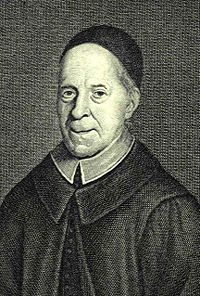
Pasquier Quesnel
Encyclopedia

France
The French Republic , The French Republic , The French Republic , (commonly known as France , is a unitary semi-presidential republic in Western Europe with several overseas territories and islands located on other continents and in the Indian, Pacific, and Atlantic oceans. Metropolitan France...
Jansenist
Jansenism
Jansenism was a Christian theological movement, primarily in France, that emphasized original sin, human depravity, the necessity of divine grace, and predestination. The movement originated from the posthumously published work of the Dutch theologian Cornelius Otto Jansen, who died in 1638...
theologian
Theology
Theology is the systematic and rational study of religion and its influences and of the nature of religious truths, or the learned profession acquired by completing specialized training in religious studies, usually at a university or school of divinity or seminary.-Definition:Augustine of Hippo...
.
He was born in Paris
Paris
Paris is the capital and largest city in France, situated on the river Seine, in northern France, at the heart of the Île-de-France region...
, and, after graduating from the Sorbonne
Collège de Sorbonne
The Collège de Sorbonne was a theological college of the University of Paris, founded in 1257 by Robert de Sorbon, after whom it is named. With the rest of the Paris colleges, it was suppressed during the French Revolution. It was restored in 1808 but finally closed in 1882. The name Sorbonne...
with distinction in 1653, he joined the French Oratory in 1657. There he soon became prominent; he took a leading part in scholarly controversy, for example against Joseph Anthelmi
Joseph Anthelmi
Joseph Anthelmi was a French ecclesiastical historian.-Life:Several of his ancestors had occupied canonries in Fréjus, the history and traditions of which they had investigated and preserved...
.
His Jansenist sympathies led to his banishment from Paris in 1681, following the formulary controversy
Formulary controversy
The Formulary Controversy, in 17th century France, pitted the Jansenists against the Jesuits. It gave rise to Blaise Pascal's Lettres Provinciales, the condemnation by the Vatican of Casuistry, and the final dissolution of organised Jansenism.- Context :...
. He took refuge with the friendly Cardinal Coislin, bishop of Orléans; four years later, however, foreseeing that a fresh storm of persecution was about to burst, he fled to Brussels
Brussels
Brussels , officially the Brussels Region or Brussels-Capital Region , is the capital of Belgium and the de facto capital of the European Union...
, and took up his abode with Antoine Arnauld
Antoine Arnauld
Antoine Arnauld — le Grand as contemporaries called him, to distinguish him from his father — was a French Roman Catholic theologian, philosopher, and mathematician...
.
There he remained till 1703, when he was arrested by order of the archbishop of Mechelen
Mechelen
Mechelen Footnote: Mechelen became known in English as 'Mechlin' from which the adjective 'Mechlinian' is derived...
. After three months imprisonment he made a highly dramatic escape, and settled at Amsterdam
Amsterdam
Amsterdam is the largest city and the capital of the Netherlands. The current position of Amsterdam as capital city of the Kingdom of the Netherlands is governed by the constitution of August 24, 1815 and its successors. Amsterdam has a population of 783,364 within city limits, an urban population...
, where he spent the remainder of his life. After Arnauld's death in 1694 Quesnel was generally regarded as the leader of the Jansenist party; and his Réflexions morales sur le Nouveau Testament played almost as large a part in its literature as Jansen
Cornelius Jansen
Corneille Janssens, commonly known by the Latinized name Cornelius Jansen or Jansenius, was Catholic bishop of Ypres and the father of a theological movement known as Jansenism.-Biography:...
's Augustinus itself.
As its title betokens, Quesnel's book was a devotional commentary on the New Testament
New Testament
The New Testament is the second major division of the Christian biblical canon, the first such division being the much longer Old Testament....
, wherein Quesnel managed to explain the aims and ideals of the Jansenist party better than any earlier writer had done; and it accordingly became the chief object of Jesuit
Society of Jesus
The Society of Jesus is a Catholic male religious order that follows the teachings of the Catholic Church. The members are called Jesuits, and are also known colloquially as "God's Army" and as "The Company," these being references to founder Ignatius of Loyola's military background and a...
attack. It appeared in many forms and under various titles, the original germ going back so far as 1668; the first complete edition was published in 1692. The papal bull
Papal bull
A Papal bull is a particular type of letters patent or charter issued by a Pope of the Catholic Church. It is named after the bulla that was appended to the end in order to authenticate it....
Unigenitus
Unigenitus
Unigenitus , an apostolic constitution in the form of a papal bull promulgated by Pope Clement XI in 1713, opened the final phase of the Jansenist controversy in France...
, in which no fewer than 101 sentences from the Réflexions morales were condemned as heretical
Heresy
Heresy is a controversial or novel change to a system of beliefs, especially a religion, that conflicts with established dogma. It is distinct from apostasy, which is the formal denunciation of one's religion, principles or cause, and blasphemy, which is irreverence toward religion...
, was obtained from Clement XI
Pope Clement XI
Pope Clement XI , born Giovanni Francesco Albani, was Pope from 1700 until his death in 1721.-Early life:...
on September 8, 1713. Quesnel died at Amsterdam.

